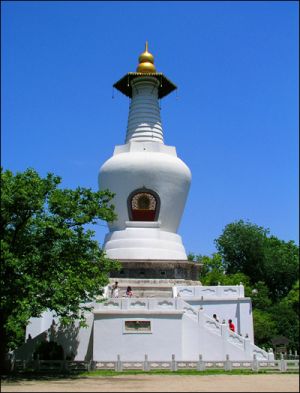Difference between revisions of "Slender West Lake"
imported>Graceshanshan |
imported>Graceshanshan |
||
| Line 1: | Line 1: | ||
'''Slender West Lake''' | '''Slender West Lake''' | ||
---- | ---- | ||
| − | Located in the west suburb of [[Yangzhou]] City, | + | Located in the west suburb of [[Yangzhou]] City, '''Slender West Lake''' was originally a natural river course leading to the [[Beijing-Hangzhou Grand Canal]] during the [[Sui]] (581-618) and [[Tang]] (618-907) periods. It's been famous for its scenic splendor since those times. |
[[File:swl1.jpg|thumb|right|White Pagoda]] | [[File:swl1.jpg|thumb|right|White Pagoda]] | ||
Revision as of 06:12, 23 June 2009
Slender West Lake
Located in the west suburb of Yangzhou City, Slender West Lake was originally a natural river course leading to the Beijing-Hangzhou Grand Canal during the Sui (581-618) and Tang (618-907) periods. It's been famous for its scenic splendor since those times.
In comparison with the West Lake of Hangzhou, the Slender West Lake is marked for its natural elfish beauty. The lake extends for 4.3 kilometers, and more than 30 hectares of its water surface are open to tourists. Over the years a number of buildings have been erected on the lakeside, including a white pagoda, a five-pavilion bridge, the Bridge Twenty-Four, a moon-watchers' observational deck, and a square pavilion, which have all incorporated the grace of southern gardens and the grandeur of northern ones.
Spanning the lake is the Five-Pagoda Bridge. Built in 1757, or the 22nd year of the Qianlong Reign of the Qing Dynasty, the bridge stands 5.8 meters high, 58 meters long and 18.6 meters wide. Of the five pavilions on the bridge, the one in the middle is the tallest, with the rest arranged symmetrically on both sides of it. The bridge is an emblem of tile city of Yangzhou.
The lake is typical of the Chinese water-based garden art combining the grace and elegance of the south with the grandeur and magnificence of the north. It's known for its 24 attractions. To fully appreciate the breathtaking views one simply has to visit.
